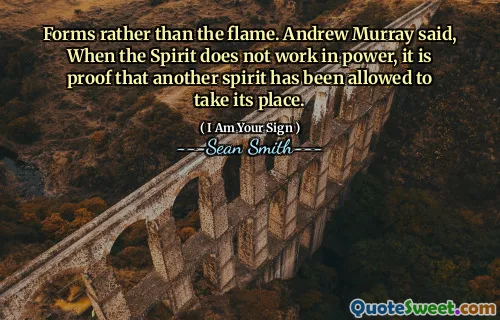
Forms rather than the flame. Andrew Murray said, When the Spirit does not work in power, it is proof that another spirit has been allowed to take its place.
[In many spiritual journeys, there's often a stark contrast between superficial rituals or formalities and the true transformative power of the Spirit. This quote underscores a crucial truth: true divine work is characterized by the fiery, passionate influence of the Spirit, not merely external appearances or mechanical rituals. When religious or spiritual pursuits become merely about going through the motions—checking boxes, reciting formal prayers, following tradition—they risk losing the transformative power that genuine spiritual experience brings. The comparison between 'forms' and 'flame' highlights how outward actions, although perhaps necessary in their own right, are insufficient for spiritual vitality. Without the power of the Spirit working actively, we may have ornate religious structures or elegant ceremonies, but these lack the dynamic, life-changing presence that ignites the soul and prompts genuine righteousness.
Andrew Murray's statement echoes the New Testament warning to ensure that the Spirit remains at the core of our faith practice, and not replaced by lesser spirits of pride, ritualism, or complacency. If the Spirit's power is absent, it indicates that other influences—be they personal desires, worldly pressures, or deceptive spirits—have advanced at the expense of divine guidance.
This reflection compels us to evaluate our spiritual lives: are we seeking the form, or are we yearning for the flame? Are our actions driven by authentic connection with the divine, or are they just tradition and habit? It challenges believers to pursue an authentic relationship with the Spirit that transforms and empowers rather than merely performing religious duties. Recognizing the difference between the superficial and the authentic ensures that one's faith remains vibrant, genuine, and alive, continually fueled by divine fire, rather than fading into mere formality. This pursuit of spiritual authenticity remains necessary in avoiding spiritual emptiness and full of the potential for profound growth and transformation.
book: '( I Am Your Sign )' - author: '---Sean Smith---'.



